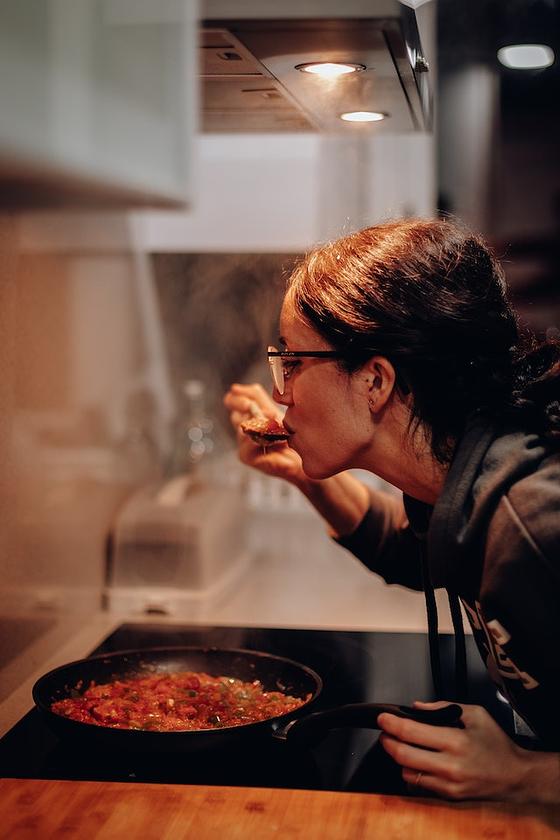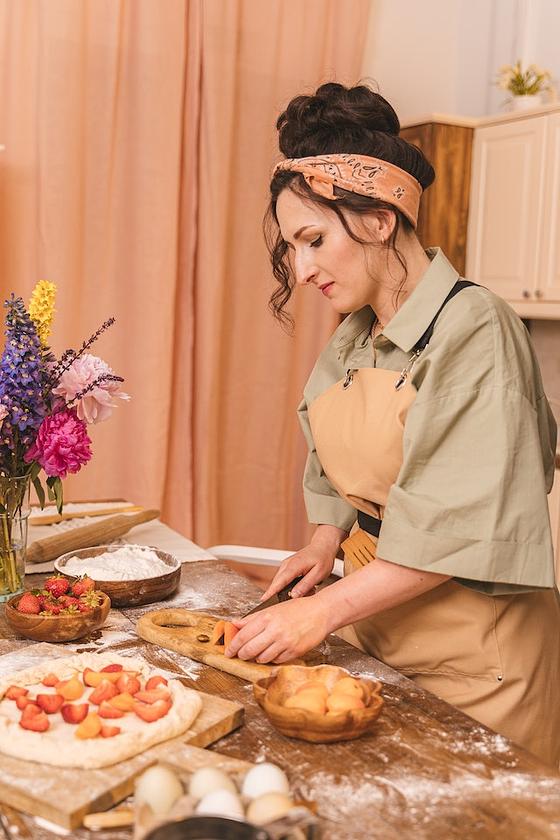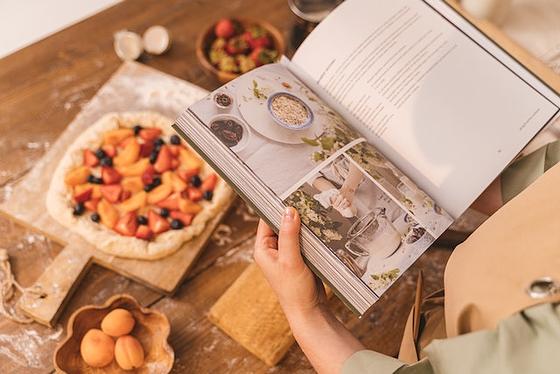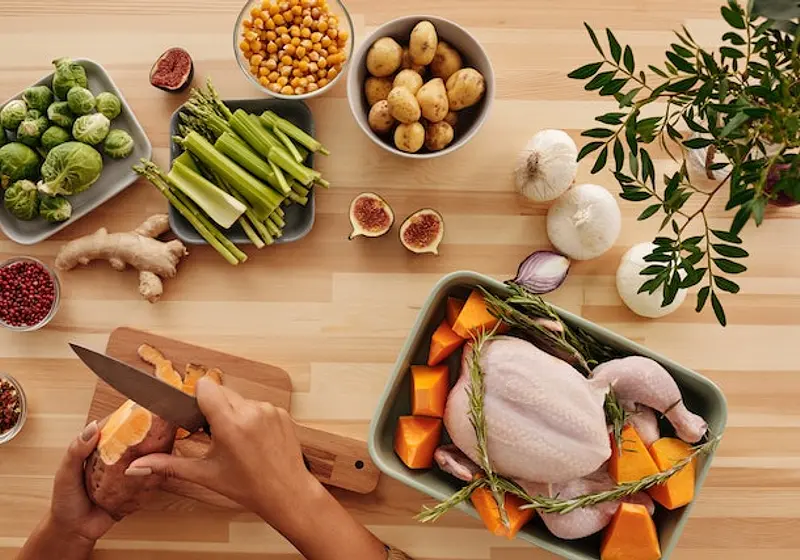Cooking is a skill that every teen should learn - it gives a sense of independence and helps prepare you to live on your own! Sadly, many tips and tricks of the kitchen remain a mystery to beginning chefs, causing frustration and confusion. I'm here to change that. Here are 10 cooking tips you might not know to demystify the art of cooking for those beginning chefs.
Let us slide into your dms 🥰
Get notified of top trending articles like this one every week! (we won't spam you)1. No Cooking Spray On Non-Stick Pans
No matter how tempting it may be, DO NOT use cooking spray on non-stick pans. Cooking spray destroys the non-stick coating and leaves behind a sticky residue that doesn't come off.
If you are having trouble with your pans, you may need to adjust the temperature. If the temperature is too high or too low, food tends to stick in the pan. Generally, medium heat works well for these types of pans.
On that same note, never use metal utensils on non-stick pans, as that will also damage the coating.

Take the Quiz: What Ramen Are You?
There are sooo many pre-packaged Ramen brands out there. Which one should you try/best fits your personality?
2. Taste Test As You Cook
There's nothing worse than putting your sweat, tears, and time into preparing a meal, only to find out the zucchinni went bad... now your whole dish is ruined. Hence, why it's important to taste your dish periodically as you cook and make adjustments as needed.
On packaged ingredients, check the expiration dates. Foods and ingredients like noodles, flour, canned goods, and dry beans and rice are all perfectly usable for at least a few weeks or longer after the best by date.
However, dairy should be used before the date printed on the package, as dairy does not stay fresh for very long and can make you sick if eaten past the date on the carton.

Juan Pablo Serrano Arenas Via Pexels
3. Wash Your Hands After Handling Raw Meat
Meat is often a main part of the dish, but raw meat can be dangerous if handled improperly. Raw meat often contains bacteria that can make you sick if ingested. Cooking the meat fully kills this bacteria and prevents you from getting sick.
After you handle the raw meat, make sure to wash your hands thoroughly with soap and warm water. You should also rinse any utensils and dishes that you used for the meat when you're done. This will prevent the bacteria from spreading to anything else.
4. Aprons Are Clothes-Savers
Cooking is a notoriously messy job. In order to protect your clothes from stains and spills, wearing an apron while you work is important.
Generally, you'll want an apron that covers most of your shirt and falls to the area just above your knees. This will provide you with plenty of protection while you work.
5. Check, Double check, and Triple Check Your Ingredients
Before you start making anything, check to make sure you have all of the ingredients and the right amounts of each one. Check again... and one more time for fun's sake! This will keep you from having to run to the store in the middle of cooking. (I've done that...and it's extremely frustrating.)
You also should make sure that you have the right kind of ingredients. For example, bread flour and cake flour will yield different results since they're designed for different purposes.
6. Not All Alternatives Are Created Equal
When you have food allergies or sensitivities, substituting certain ingredients becomes a necessity. The problem is, that many alternatives don't work well in standard recipes.
Because of this, there are usually two options: finding a recipe that you won't have to amend, or finding substitutes that work as well as regular ingredients.
Some of my favorite alternatives:
-
Bob's Red Mill 1 to 1 mix (For gluten-free cooking and baking.)
-
Turbinado Sugar (less processed sugar.)
-
Applesauce (Used in baking instead of eggs.)
-
Almond Milk (Works in place of most traditional dairy milks.)
-
Brown Rice Noodles (Instead of wheat noodles. DO NOT use corn noodles, they taste like glue!)

ANTONI SHKRABA production Via Pexels
7. Coconut Oil and Butter Help With Burns
Getting hurt is, unfortunately, a part of being a chef. Burns are one of the most common ailments chefs face in the kitchen.
While running a burn under cold water does help, it doesn't completely take the sting out of a burn. What does take the sting out is a dab of coconut oil or butter (not margarine). It will hurt a little when you first apply it, but the longer you leave it on the burn, the better it will feel.
8. Follow The Instructions
In some recipes, you can put ingredients in any order. But in certain cuisines, French, for example, the ingredients have to be added in a certain order or heated to a very specific temperature in order for the recipe to turn out just right. This makes it incredibly important to follow the recipe as closely as possible.
Before you begin, read through the recipe very carefully. Make sure you understand each step of the recipe. If there's anything in the recipe you don't understand, do some research on it until you feel confident in your ability.

9. Clean Up As You Go
No matter what you're making, cooking is a messy business that will wreck your kitchen faster than you can say cannoli. Because of this, it's important to clean up your mess as you cook.
This is a bit of a hard habit to get into and kind of annoying, but it is totally worth it - trust me.
Start by putting ingredients away after you're finished with them and throwing empty containers in the trash or recycling bin. Once you are used to doing that, wash the dishes and utensils after you're done using them. This will save you so much time in the long run!
10. Delicious Meals Don't Have To Be Fancy or Expensive
People often think that great meals come from using fancy ingredients or employing complex cooking techniques. This couldn't be further from the truth. Unless you're competing on the Food Network, cooking isn't about having the most ornate dish, it is about love for both food and people. Even something as simple as a bowl of chili is special when it is prepared with love.

August de Richelieu Via Pexels
Not only is cooking a great skill to have, but it is an art form that brings happiness and comfort to those who eat what you've prepared. After they've cleaned their plates, if their smiles still remain, you have the mark of a true chef. Happy cooking, friends!

















.jpg)
